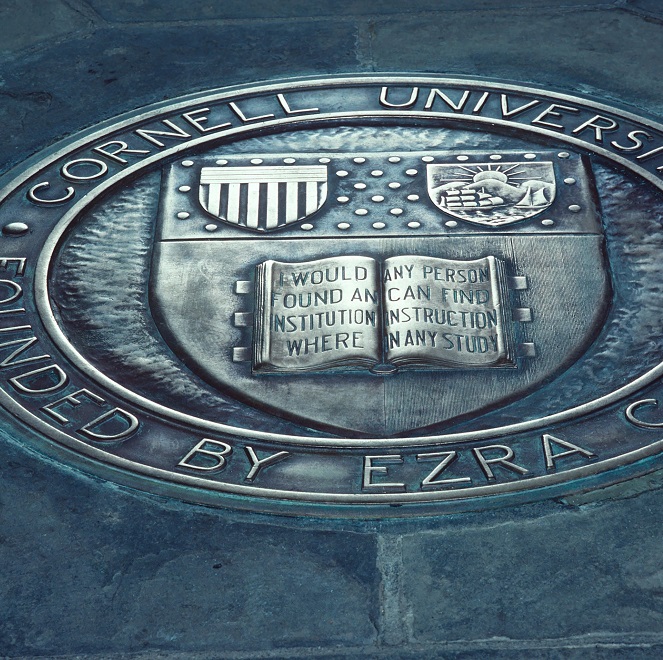News and Events
Full listing
February 16, 2022
Cornell researchers and a startup have received more than $7 million in federal grants to advance novel clean energy research that includes wirelessly charging electric vehicles, low-carbon jet fuel and construction materials made from waste.
Sen. Charles Schumer (D-N.Y.) announced the grants Feb. 16 from the U.S. Department of Energy Advanced Research Projects Agency-Energy (ARPA-E). The grants prioritize funding technologies that support fresh approaches to clean energy challenges as part of the ARPA-E OPEN 2021 program.
Schumer said in a statement that the cutting-edge research being conducted at Cornell and in Ithaca is integral to the fight against climate change.
February 11, 2022
Four Cornell faculty members from three different colleges received the 2022 Kappa Delta Ann Doner Vaughn Award for their collaborative research on the mechanics and composition of articular cartilage and its relevance to disease.
The award, which recognizes research in musculoskeletal disease or injury with great potential to advance patient care, was presented to Lawrence Bonassar, the Daljit S. and Elaine Sarkaria Professor in the Meinig School of Biomedical Engineering and the Sibley School of Mechanical and Aerospace Engineering at Cornell; Itai Cohen, professor of physics in the College of Arts & Sciences; Lisa Fortier, Ph.D.’98, the James Law Professor of Surgery at the College of Veterinary Medicine; and Michelle Delco ’98, D.V.M.’02, Ph.D.’16, the Harry M. Zweig Assistant Research Professor of Equine Health in the Department of Clinical Sciences at the College of Veterinary Medicine.
February 9, 2022
Conventional batteries are a lot like camels. They’re great for storage and transportation, but they’re not exactly speedy.
For technologies that require a fast discharge of energy, such as heart defibrillators, alternative materials are often used, foremost among them, antiferroelectrics.
There are only a handful of known antiferroelectric materials, and most of them contain lead, so they aren’t safe enough for everyday applications. Now, a Cornell-led collaboration has discovered a new approach for making a lead-free antiferroelectric that performs as well as its toxic relatives.
February 7, 2022
From cell-sized robots to quantum computers to the manipulation of human genes, the Arts Unplugged: Science of the Very, Very Small event on March 9 will explore the nanoscale and quantum innovations shaping our future.
Presented by the College of Arts and Sciences, the virtual event will include short talks by and conversations with some of Cornell’s top scientists and humanists, including Nobel Prize-winner Roald Hoffmann. The event is free and the public is invited to register.
February 7, 2022
The College of Arts and Sciences has selected the 2022 cohort of Klarman Postdoctoral Fellows: seven exceptional early-career scholars who will be awarded three-year fellowships to pursue independent research in the arts and humanities, social sciences and natural sciences.
They will begin their fellowships in fall 2022, exploring some of humanity’s most pressing questions, each working with an A&S faculty mentor.
“Our first two cohorts of Klarman Postdoctoral Fellows have already enriched our academic community in so many ways – sparking new ideas, perspectives and creativity across Cornell,” said President Martha E. Pollack. “These highly coveted fellowships attract applicants of an extraordinary caliber, and I look forward to seeing what our newest Klarman Fellows will achieve and contribute in the years ahead.”
February 3, 2022
Cornell chemists have discovered a class of nonprecious metal derivatives that can catalyze fuel cell reactions about as well as platinum, at a fraction of the cost.
This finding brings closer a future where hydrogen fuel cells efficiently power cars, generators and even spacecraft with minimal greenhouse gas emissions.
“These less expensive metals will enable wider deployment of hydrogen fuel cells,” said Héctor D. Abruña, the Émile M. Chamot Professor in the Department of Chemistry and Chemical Biology in the College of Arts and Sciences. “They will push us away from fossil fuels and toward renewable energy sources.”
January 28, 2022
This Cornell Research story focuses on the work of physics faculty members Katja C. Nowack, assistant professor, and Eun-Ah Kim, professor, who are collaborating with researchers at Harvard University and Stanford University to pursue new superconducting interfaces.
January 26, 2022
Seven Cornell faculty members have been elected fellows of the American Association for the Advancement of Science (AAAS), the world’s largest general scientific society.
The association elected 564 new fellows in 2021, honoring their efforts to advance research and its applications in scientifically or socially distinguished ways. New fellows will be presented with an official certificate and a gold and blue (representing science and engineering, respectively) rosette pin.
January 13, 2022
The IEEE Board of Directors has named Professor Huili Grace Xing an IEEE Fellow, recognized for contributions to GaN high-electron-mobility transistors. Xing is the William L. Quackenbush Professor of Engineering and Associate Dean on Research and Graduate Studies.
Xing’s research is focused on fundamental work toward next generation electronic materials and devices. “We are currently engaged in doping science in polar semiconductors, ultrawide bandgap semiconductors for energy-efficient and agile power electronics, deep UV light emitters, quantum materials and technologies for secure communication and complex problem solving,” Xing said.
January 11, 2022
With a little twist and the turn of a voltage knob, Cornell researchers have shown that a single material system can toggle between two of the wildest states in condensed matter physics: the quantum anomalous Hall insulator and the two-dimensional topological insulator.
By doing so, they realized an elusive model that was first proposed more than a decade ago, but which scientists have never able to demonstrate because a suitable material didn’t seem to exist. Now that the researchers have created the right platform, their breakthrough could lead to advances in quantum devices.
The team’s paper, “Quantum Anomalous Hall Effect from Intertwined Moiré Bands,” published Dec. 22 in Nature. The co-lead authors are former postdoctoral researchers Tingxin Li and Shengwei Jiang, doctoral student Bowen Shen and Massachusetts Institute of Technology researcher Yang Zhang.

